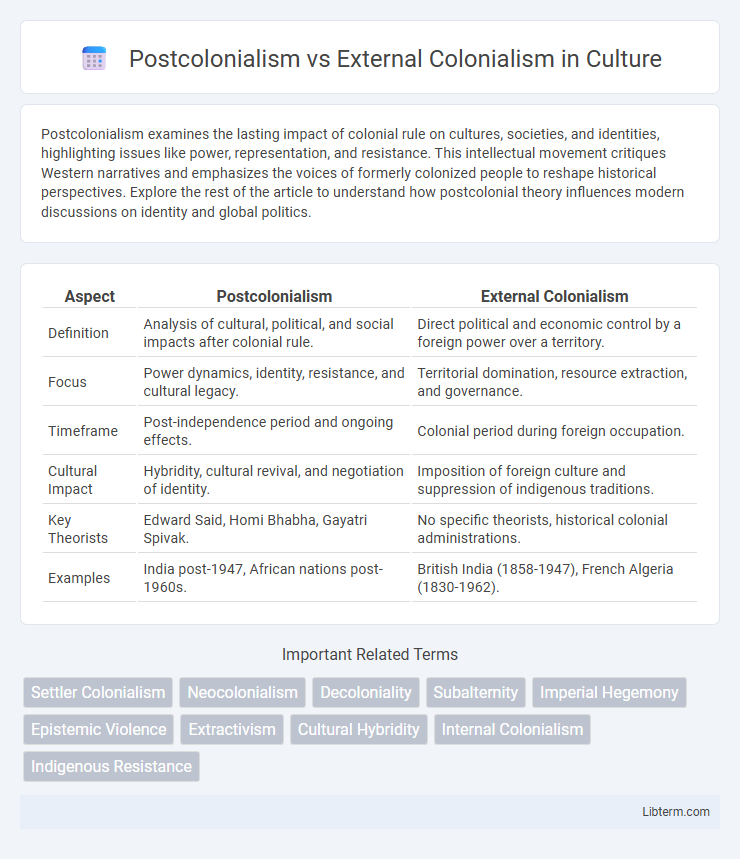Postcolonialism examines the lasting impact of colonial rule on cultures, societies, and identities, highlighting issues like power, representation, and resistance. This intellectual movement critiques Western narratives and emphasizes the voices of formerly colonized people to reshape historical perspectives. Explore the rest of the article to understand how postcolonial theory influences modern discussions on identity and global politics.
Table of Comparison
| Aspect | Postcolonialism | External Colonialism |
|---|---|---|
| Definition | Analysis of cultural, political, and social impacts after colonial rule. | Direct political and economic control by a foreign power over a territory. |
| Focus | Power dynamics, identity, resistance, and cultural legacy. | Territorial domination, resource extraction, and governance. |
| Timeframe | Post-independence period and ongoing effects. | Colonial period during foreign occupation. |
| Cultural Impact | Hybridity, cultural revival, and negotiation of identity. | Imposition of foreign culture and suppression of indigenous traditions. |
| Key Theorists | Edward Said, Homi Bhabha, Gayatri Spivak. | No specific theorists, historical colonial administrations. |
| Examples | India post-1947, African nations post-1960s. | British India (1858-1947), French Algeria (1830-1962). |
Defining Postcolonialism and External Colonialism
Postcolonialism examines the cultural, political, and economic impacts that persist after the end of formal colonial rule, emphasizing the power dynamics and identity struggles of formerly colonized societies. External colonialism refers to the direct control and exploitation of one country or territory by a foreign power through military, economic, and political dominance. While external colonialism involves active occupation and administration, postcolonialism addresses the ongoing effects and resistance in the post-independence era.
Historical Origins of Colonial Practices
Postcolonialism examines the cultural, political, and economic legacy left by External Colonialism, which historically involved European powers exploiting territories from the 15th to 20th centuries through conquest, resource extraction, and settlement. External Colonialism's origins trace back to the Age of Discovery, when Spain and Portugal spearheaded overseas expansion, followed by Britain, France, and the Netherlands establishing empires overseas to control trade routes and natural resources. The historical practices of External Colonialism entrenched systems of racial hierarchy, economic dependency, and political domination that postcolonial theory critically analyzes to understand the enduring impacts on formerly colonized societies.
Key Differences between Postcolonialism and External Colonialism
Postcolonialism examines the cultural, political, and economic legacies left by imperial powers after formal colonial rule ends, focusing on identity, resistance, and hybridity within formerly colonized societies. External colonialism refers to direct foreign domination and control over a territory's governance, resources, and people during the colonial period. Key differences include postcolonialism's emphasis on ongoing psychological and structural impacts post-independence, whereas external colonialism centers on physical occupation and administrative control by an external colonial power.
Impacts on Indigenous Societies and Cultures
Postcolonialism examines the lasting impacts of colonial domination on indigenous societies, highlighting cultural erosion, identity struggles, and socio-economic disparities imposed by external colonial powers. External colonialism directly disrupted indigenous governance, language, and traditions through enforced assimilation and resource exploitation, leading to cultural fragmentation and loss of heritage. The interplay between imposed colonial structures and resilient indigenous resistance shapes contemporary challenges in reclaiming cultural autonomy and socio-political empowerment.
Political Structures: Shifts and Continuities
Postcolonialism highlights the transformation of political structures following the end of external colonial rule, emphasizing the emergence of new national governments often shaped by both indigenous traditions and colonial legacies. External colonialism imposed centralized administrative systems and legal frameworks designed to control territories and resources, creating enduring institutional hierarchies. Despite formal independence, many postcolonial states experience continuities in authoritarian governance, bureaucratic centralization, and neo-colonial influences, reflecting complex shifts rather than complete ruptures in political organization.
Economic Consequences of Both Forms of Colonialism
Postcolonialism highlights the persistent economic disparities rooted in historical external colonialism, where foreign powers extracted resources and exploited local labor to benefit their own economies. External colonialism often led to the establishment of dependent economic structures, characterized by monoculture exports and limited industrial development in the colonized regions. Postcolonial economic consequences include ongoing challenges such as underdevelopment, unequal trade relationships, and the struggle to diversify economies previously shaped by external colonial powers.
Resistance and Decolonization Movements
Resistance in postcolonial contexts often involves cultural, intellectual, and political efforts to reclaim identity and autonomy, contrasting with external colonialism where resistance typically included armed struggle against foreign military occupation. Decolonization movements in postcolonial societies emphasize dismantling internalized colonial structures and addressing neocolonial economic dependencies, while resistance to external colonialism primarily focused on expelling foreign rulers and achieving national sovereignty. Both forms of resistance contribute to the broader goal of self-determination, but postcolonialism highlights ongoing struggles against systemic inequalities rooted in colonial legacies.
Contemporary Relevance and Challenges
Postcolonialism critically examines the lingering effects of External Colonialism on contemporary societies, emphasizing issues such as identity, cultural hegemony, and economic dependency in formerly colonized nations. The ongoing challenges include neocolonial practices, where external powers exert influence through economic, political, and military means, perpetuating inequality and undermining sovereignty. Understanding the dynamic between Postcolonial theory and External Colonialism highlights the importance of addressing systemic power imbalances to foster genuine autonomy and sustainable development in the global South.
Postcolonial Theory: Critical Perspectives
Postcolonial theory critically examines the cultural, political, and psychological impacts of colonization on formerly colonized societies, emphasizing identity reconstruction and resistance to colonial power structures. It challenges Eurocentric narratives by highlighting subaltern voices and the ongoing effects of imperialism in globalization, neocolonialism, and diaspora experiences. Key scholars such as Edward Said, Gayatri Chakravorty Spivak, and Homi K. Bhabha provide analytical frameworks for understanding hybridity, mimicry, and the politics of representation within postcolonial discourse.
Moving Forward: Lessons and Future Directions
Postcolonialism emphasizes reclaiming indigenous identity and cultural autonomy, offering critical frameworks for addressing historical trauma and power imbalances left by external colonialism. Future directions involve integrating decolonial strategies with policy reforms to promote economic equity and social justice in formerly colonized regions. Embracing interdisciplinary approaches and community-driven initiatives enhances sustainable development and resilience against neocolonial influences.
Postcolonialism Infographic

 libterm.com
libterm.com